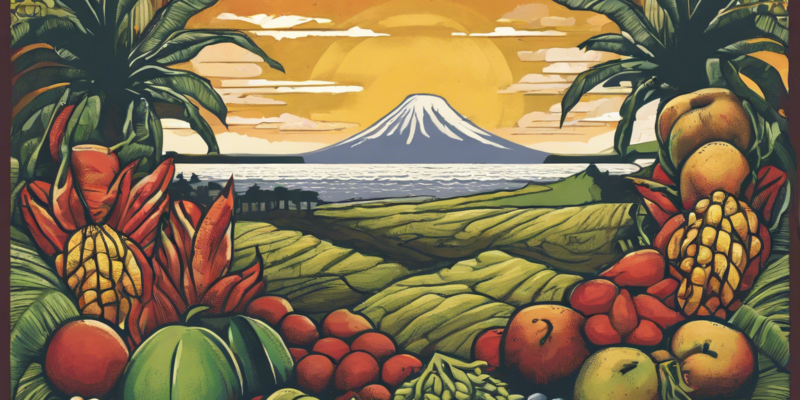Hawaii’s Big Island is a treasure trove of local flavors and sustainable practices. From its rich volcanic soil to its diverse microclimates, the Big Island offers a unique environment for growing a wide variety of crops. In this article, we will delve into the world of Big Island grown produce, highlighting the flavors, practices, and people behind this vibrant agricultural community.
The Big Island Agricultural Landscape
The Big Island of Hawaii, also known as the Island of Hawaii, is the largest and youngest island in the Hawaiian archipelago. Its diverse landscape is characterized by lush rainforests, fertile valleys, rolling grasslands, and volcanic slopes. The island is home to two of the most massive mountains in the world, Mauna Kea and Mauna Loa, which play a vital role in creating the island’s unique microclimates.
Sustainable Farming Practices
Organic Farming
Organic farming is a growing trend on the Big Island, with many farms embracing natural and sustainable methods to produce high-quality crops. By avoiding synthetic pesticides and fertilizers, these farms prioritize soil health and biodiversity, resulting in healthier and more flavorful produce.
Regenerative Agriculture
Regenerative agriculture takes sustainable farming a step further by focusing on soil health and ecosystem restoration. Farms practicing regenerative agriculture aim to improve soil fertility, increase water retention, and enhance biodiversity, ultimately creating a more resilient and productive farming system.
Permaculture
Permaculture is another sustainable farming approach gaining popularity on the Big Island. By designing farming systems that mimic natural ecosystems, permaculture farms strive to create self-sustaining and harmonious environments. These farms often integrate crop diversity, agroforestry, and water conservation techniques to maximize productivity while minimizing environmental impact.
Big Island Grown Produce
Kona Coffee
Kona coffee is world-renowned for its smooth and rich flavor. Grown on the volcanic slopes of the Kona district, this high-quality arabica coffee is prized for its unique terroir and meticulous cultivation practices. Many Kona coffee farms offer tours and tastings, allowing visitors to experience the true essence of Hawaiian coffee.
Macadamia Nuts
Big Island grown macadamia nuts are a delicious and nutritious treat. These creamy nuts are known for their buttery flavor and crunchy texture. With their high levels of monounsaturated fats and antioxidants, macadamia nuts are not only tasty but also good for your health.
Tropical Fruits
The Big Island is a paradise for tropical fruit lovers. From sweet pineapple and juicy papaya to exotic lychee and creamy avocado, the island boasts a bounty of fresh and flavorful fruits. Many farms offer fruit-picking tours, allowing visitors to taste the fruits at the peak of ripeness.
Supporting Local Farmers
Farmers’ Markets
One of the best ways to support local farmers on the Big Island is by visiting farmers’ markets. These vibrant markets offer a wide array of fresh produce, baked goods, artisanal products, and more. By buying directly from farmers, you can help sustain the local agricultural community and enjoy the freshest ingredients.
Farm-to-Table Restaurants
Farm-to-table restaurants on the Big Island showcase the diverse flavors of locally grown produce. Chefs work closely with farmers to create seasonal menus that highlight the freshness and quality of Big Island ingredients. By dining at farm-to-table restaurants, you can savor the true taste of Hawaii while supporting sustainable and ethical food practices.
Frequently Asked Questions (FAQs)
1. What makes Big Island grown produce unique?
Big Island grown produce benefits from the island’s diverse microclimates and rich volcanic soil, resulting in flavorful and high-quality crops.
2. How can I support sustainable farming on the Big Island?
You can support sustainable farming on the Big Island by buying from organic farms, visiting farmers’ markets, and dining at farm-to-table restaurants.
3. Are there any guided tours of Big Island farms available?
Yes, many farms on the Big Island offer guided tours where visitors can learn about sustainable farming practices and taste fresh produce.
4. What is the significance of regenerative agriculture?
Regenerative agriculture focuses on improving soil health, increasing biodiversity, and restoring ecosystems, creating a more resilient and productive farming system.
5. Can I purchase Big Island grown products online?
Yes, many Big Island farms and producers offer online sales, allowing you to enjoy the flavors of Hawaii from the comfort of your home.


